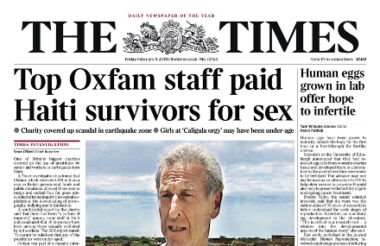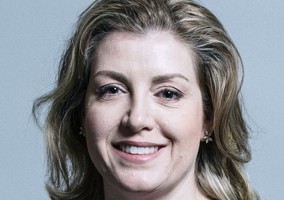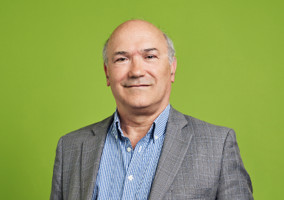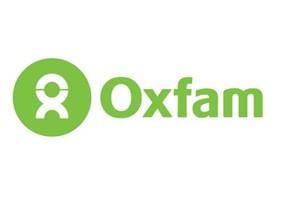It began on 9 February, when the Times published a front page article accusing Oxfam of covering up the use of prostitutes by senior aid workers in Haiti, who were there in 2011 following an earthquake in 2010. The newspaper had been leaked a confidential report from that year about Oxfam’s investigation into allegations, which the charity has since published.
The report confirms that four Oxfam employees were dismissed and three resigned following accusations including using prostitutes on the charity’s property, sexual exploitation of employees, fraud, negligence and nepotism. It reveals that three of the workers accused of sexual misconduct physically threatened witnesses during the investigation.
The Times followed its initial story by reporting further allegations of sexual misconduct by Oxfam staff in Chad in 2006. The Oxfam country director in Haiti who resigned in 2011 over the Haiti investigation, Roland van Hauwermeiren, was head of Oxfam in Chad in 2006. Additional concerns were raised on 12 February, when Helen Evans, Oxfam’s former global head of safeguarding between 2012 and 2015, gave an interview to Channel 4. She said Mark Goldring, Oxfam’s chief executive, stopped her from presenting to the board a report compiled from confidential internal surveys of the charity’s international aid staff that highlighted further instances of sexual harassment, sex in exchange for aid handouts and rape.
Goldring’s email to Evans, shared with Channel 4, said: “You are right that this is a serious issue. LT recognised this but felt that there was nothing as a group that we could actually add to the situation, which was clearly laid out in the paper.”
Evans also said that there had been incidents of abuse involving volunteers, some under 18, reported at Oxfam’s charity shops during her tenure. She raised concerns about Oxfam not conducting Disclosure and Barring Service (DBS) checks. She said: “That troubled me because I knew Oxfam was not conducting the criminal record checks that it needed to conduct, that children were being left alone with adults who hadn’t been criminal record checked.”
The charity published a statement saying that it introduced standard DBS checks for all shop managers and deputy managers during Evans’s tenure, and that since 2015, all its 900 shop and deputy shop managers are required to have enhanced DBS checks.
It added: “We now carry out DBS checks for any volunteers that have supervisory responsibilities and take references for all others. We are currently exploring the possibility of carrying out DBS checks on all 23,000 volunteers.”
A few days later, the charity admitted it made a “serious error” after it re-hired aid worker Gurpreet Singh to work on a short-term contract in Ethiopia less than three months after he was sacked for sexual misconduct in Haiti.
Damage
On 13 February, following the second Times story related to Oxfam staff’s behaviour in Chad, deputy chief executive Penny Lawrence resigned. She said: “It is now clear that these allegations – involving the use of prostitutes and which related to behaviour of both the country director and members of his team in Chad – were raised before he moved to Haiti.
“As programme director at the time, I am ashamed that this happened on my watch and I take full responsibility. I am desperately sorry for the harm and distress that this has caused to Oxfam’s supporters, the wider development sector and most of all the vulnerable people who trusted us.”
Goldring told MPs on 20 February that 7,000 people had cancelled direct debit donations to Oxfam since the scandal broke.
Oxfam has agreed to withdraw from applying for new government funding until the current crisis over sexual misconduct has been resolved.
According to Oxfam’s published accounts for the year ending 31 May 2017, the charity received £31.7m worth of funding from the Department for International Development (DfID).
Meanwhile, a spokesman for the European Commission, which gave around £29m to Oxfam last year, said it was waiting for the charity to “fully clarify the allegations with maximum transparency as a matter of urgency”.
Oxfam response
In her initial response, Oxfam’s chair Caroline Thomson announced a package of measures to strengthen the prevention and handling of sexual abuse cases.
Thomson said the charity would strengthen its vetting and recruitment of staff, establish a “new, independent, external whistleblowing helpline”, overhaul its staff induction process, and “recommit to report to the appropriate authorities in full, any issues that arise that could affect the safety of those we work for or the confidence of the public”.
Oxfam International executive director Winnie Byanyima later announced a “comprehensive action plan to stamp out abuse”. This package of measures included a new independent High-Level Commission on Sexual Misconduct, Accountability and Culture Change, which will be comprised of leading women’s rights experts and which will be able to access Oxfam records and interview staff, partners and communities it supports around the world.
The action plan also includes the immediate creation of a new global database of accredited referees, which has been designed to end the use of forged, dishonest or unreliable references by past or current Oxfam staff. Oxfam has said it will not be issuing any references until this is in place.
Finally, Oxfam has committed to an immediate injection of money into its safeguarding processes, with the number of people working in safeguarding to more than double over the coming weeks and annual funding to be more than tripled to £720,000.
Goldring wrote to Oxfam’s shoppers, supporters and volunteers to reassure them that the charity has taken steps to improve its handling of misconduct in its shops. He said: “We have introduced a whole range of more robust measures to improve how we deal with these issues. I know that today, our shops are a safe place for staff and volunteers alike.”
Other NGOs respond
It emerged that van Hauwermeiren had previously been pushed out of a job at aid charity Merlin, now part of Save the Children, and that after leaving Oxfam had gone on to work for Action Against Hunger between 2012 and 2014.
In a statement, Action Against Hunger said it had not received any information about van Hauwermeiren or “warning on the risks of employing him”. It said it had now “begun a process to closely scrutinise the time he was employed by us”, and committed to full disclosure, collaborating in full with the authorities.
In an open letter to Belgian broadcaster VTM, van Hauwermeiren denied using prostitutes in Haiti but admitted he had “intimate contact” on three occasions with a “grown, honourable lady, not a victim of the earthquake”.
Bond, the umbrella body for international development charities, said it held a meeting with almost 20 leading charities where they agreed a new set of safeguarding principles. These include “full disclosure of all safeguarding concerns at the earliest opportunity”, and collaborating with the Department for International Development and the Charity Commission on a new system for “passporting, registration or accreditation of humanitarian and development practitioners”.
A study showing widespread sexual assault and harassment of workers within the aid sector published last year also came to light during coverage of the Oxfam scandal. The report, Stop Sexual Assault Against Humanitarian and Development Aid Workers, was published in May 2017 by the Feinstein International Center, parts of Tufts University in Massachusetts, United States.
Report author Dylan Mazurana appeared on BBC Newsnight where she said that problems with safeguarding were “widespread throughout the sector”, but Oxfam had actually been shown in the report as an example of “best practice” which other organisations can learn from.
The regulator
The Charity Commission opened a statutory inquiry into Oxfam over concerns that the aid charity did not fully disclose details to the regulator of sexual misconduct by its staff in Haiti. The Commission said it has concerns that Oxfam “may not have fully and frankly disclosed material details about the allegations at the time in 2011, its handling of the incidents since, and the impact that these have both had on public trust and confidence”.
It later confirmed that its inquiry would examine the charity’s governance, scrutinise the charity’s progress with implementing safeguarding requirements previously agreed with the Commission in 2017, and assess what additional actions the charity should take.
The Commission also announced a summit on safeguarding for UK charities, to accompany one for international charities announced by DfID. The summit will be co-chaired by Tracey Crouch, minister for civil society.
But some have questioned whether the Commission could have done more at the time. Speaking on Channel 4 News, Damian Collins MP, chair of the Digital Culture Media and Sport Committee, said that there are “difficult questions” for the Charity Commission as to why it did not act sooner. He said: “If this doesn’t warrant a really serious investigation at the highest level, what would? These are some of the worst allegations that can be made against any organisation, let alone a British charity carrying out aid work with the support of the British government.”
Also speaking to Channel 4 News, Sir Stephen Bubb, the former chief executive of Acevo, said he warned the Charity Commission years ago that it needed to put more resources into safeguarding instead of focusing so much on scrutiny of charities’ links to terrorism.
Related articles












